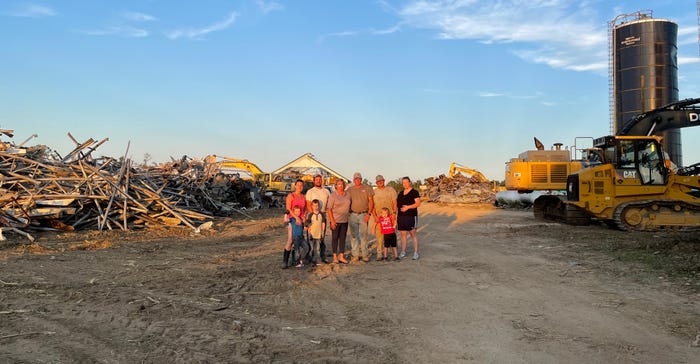
Days after the remnants of Hurricane Ida brought epic rain, flooding and wind damage to parts of the mid-Atlantic and Northeast, Eric Eachus and his family are wondering why the destructive storm targeted their farm.
“I don’t know how to explain it. Didn’t think something like this could happen in New Jersey,” says Eachus, who runs his family’s Wellacrest Farms Inc. in Mullica Hill, Gloucester County — the state’s largest dairy farm with 1,400 cows and 3,000 owned and rented acres — with his father, Wally.
An EF3 tornado associated with the remnants of Ida ripped through the farm, tearing off roofs, destroying the milking parlor and collapsing a holding pen. A freestall barn collapsed, trapping 250 cows before construction crews came and freed the animals.
Fields of corn and soybeans adjacent to the Mullica Hill farm were flattened.
At nearby Grasso Farms, a 300-acre vegetable operation, a brand-new packing and cooling facility that the Grasso family completed weeks ago was nearly destroyed. According to a Facebook post by the Gloucester County Board of Agriculture, two homes inhabited by the farm’s owners were destroyed, along with buildings, greenhouses, trucks and other equipment.
Michelle Infante-Casella, the head of Rutgers Cooperative Extension Gloucester County, says the farm won’t be able to pack its vegetables this year, relying instead on other farms to pack the crops.
Two GoFundMe accounts have been set up to help each farm. Eachus says the family has insurance and plans on rebuilding. Infante-Casella says the Grasso family’s farm is also insured, but she is not sure whether the policy will cover all their expenses.
A major disaster declaration was announced for six New Jersey counties — Bergen, Gloucester, Hunterdon, Middlesex, Passaic and Somerset — by FEMA earlier this week, paving the way for federal help — including grants for temporary housing and home repairs, low-cost loans to cover uninsured property losses, and other programs to help individuals and business owners recover from the effects of the disaster.
The state’s Farm Service Agency is gathering information from farmers to see if a disaster declaration should be requested for certain counties, which would provide additional aid for farmers in need.
It could have been worse
Although the farm was flattened, Eachus says that no one was seriously hurt, and only nine cows died as a result of the storm. It could have been a lot worse, he says, considering the power of the winds and the extensive damage that was done.
He says the community immediately stepped up to help his family start picking up the pieces. The night of the storm, construction crews volunteered time to start clearing up debris and helped put up a makeshift milking facility to enable the family to milk the cows.
Merryman’s Pub, a local restaurant, donated a portion of its profits from Labor Day to help the farm out.
Makeshift pens were also put together using anything that could be found in the debris, Eachus says.
A GoFundMe account set up for the family has thus far raised more than $77,000 as of Tuesday with donations coming in from around the world.
The Grasso Farms GoFundMe page has raised more than $79,000.
Have damage? Report it
The state’s FSA office is urging producers who have experienced damage from the storm to report it as soon as possible to get the process for federal aid moving.
USDA has published a brochure, Disaster Assistance Programs at a Glance, as a quick reference guide to available Farm Service Agency, Natural Resources Conservation Service and Risk Management Agency disaster assistance programs.
You can also visit farmers.gov to learn more about USDA disaster assistance programs. But the best place to start is by contacting your USDA service center.
About the Author(s)
You May Also Like






